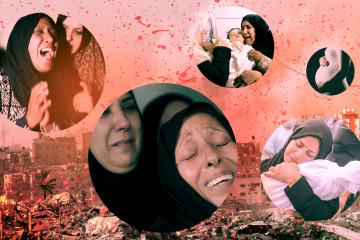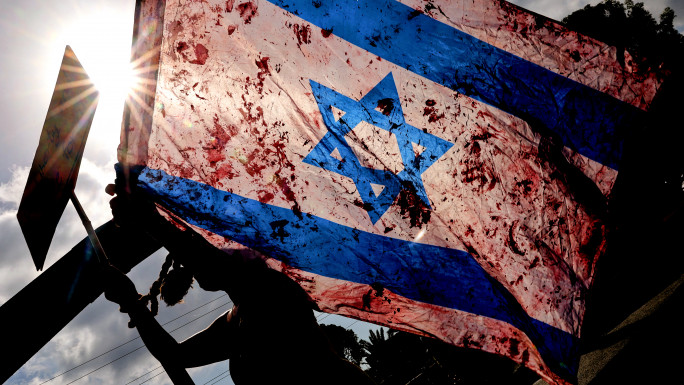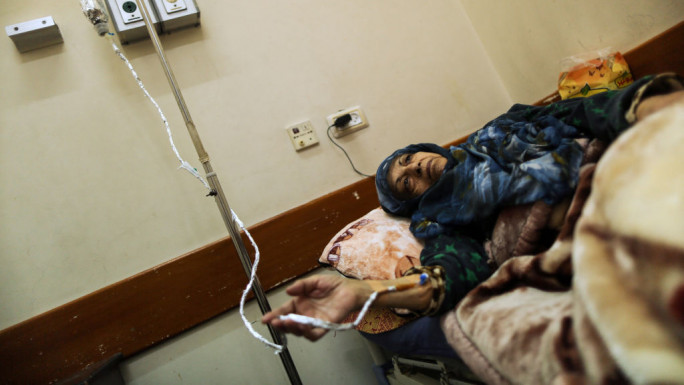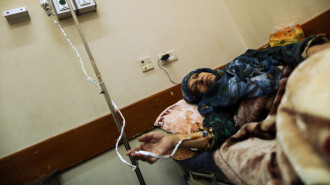
A grave affair: Miscarriage rates in Gaza turn pregnancy into death sentence

“We’ve heard of numerous stories of women arriving at the hospital either dead or dying, and many others having post-mortem Caesarean sections," Doctors without Borders' paediatrician Tanya Haj-Hassan tells The New Arab.
"In all the cases that I personally know of, the baby has died.”
The MSF doctor, who has worked in Gaza as a medical trainer for over 10 years, said that foetuses’ in the womb are being “sentenced to death” as a result of stress of the mother in preterm delivery, starvation and dehydration, and direct exposure to armed conflict.
"Hospitals are besieged, bombed, deprived of fuel, water, and electricity. It’s a systematic annihilation of the entire healthcare system"
“I went to the hospital because I was really sick. I went to the doctor and she examined me. The doctor told me the fetus had no pulse. There was no hope,” said a four-month-pregnant woman in Gaza, who lost her unborn child after enduring stress from seeing her house bombed and rushing to the hospital.
“Many pregnant women deliver outside of the hospital because they can’t reach it. There is a very high incidence of preterm labour and abortion and many cases of sepsis and neonatal deaths,” a director of a hospital in Gaza told The New Arab in a message.
Health organisations have reported a 300 percent surge in miscarriages among women in Gaza since Israel’s bombing campaign on the besieged Palestinian enclave began on October 7.
The staggering rise is explained by issues like malnutrition and lack of access to healthcare and hygiene due to the Israeli ongoing blockade of essential supplies.
Back in early November, UN agencies warned that women were not able to give birth safely, and maternal deaths would ramp up given the lack of access to adequate care. They also alerted that the psychological toll of the fighting had a direct impact on reproductive health, including an increase in stress-induced miscarriages, stillbirths and premature births.
More than four months into Israel’s unrelenting assault, the situation has only worsened as Gaza’s health system completely collapses.
“Hospitals are besieged, bombed, deprived of fuel, water, and electricity. It’s a systematic annihilation of the entire healthcare system," Haj-Hassan, a doctor, explained with dismay.
"The facility, which only has one operating room and is designed to receive 30 to 40 pregnant women per day, now handles 300 to 400 cases daily"
In their recent mission to the Emirati Hospital, UNFPA staff found “how little maternal health care” is currently available to expectant mothers in Gaza, and that women recovering from Caesarean births are discharged within a day due to lack of capacity and very limited resources.
The facility, which only has one operating room and is designed to receive 30 to 40 pregnant women per day, now handles 300 to 400 cases daily.
prematurity, and congenital abnormalities [Getty Images]
Gaza: 'Delivered into hell'
Returning from a recent visit to the Gaza Strip, a UNICEF spokesperson, Tess Ingram, described “mothers bleeding to death,” while babies are being “delivered into hell.” She also spoke of one nurse who had performed “emergency Caesareans on six dead women.”
“There’s no antenatal care for pregnant women. There are no beds, many women have delivered on mattresses in the hallways on the floor. Our hospital is small. The other day, we did 23 Caesareans and more than 60 deliveries,” said Haj-Hassan, while reading out messages received from the head of obstetrics at a hospital in Rafah.
The paediatric doctor mentioned the case of a friend’s friend in Gaza whose pregnant wife needs to have a C-section and is panicking because he doesn’t know where she will be able to undergo the surgery since all the hospitals are overwhelmed by wounded people.
Amid life-threatening conditions, if they are lucky to reach a medical centre, expectant mothers are often turned away because the delivery rooms are already full.
When admitted, they are typically dismissed within a few hours after delivery given that healthcare facilities are constantly saturated.
|
Ammal Awadallah, the executive director of the Palestinian Family Planning and Protection Association (PFPPA), spoke about the anxiety and distress their health workers in Gaza have often observed among pregnant women.
“They fear what will happen when they are ready to deliver. Will they be able to reach a health facility or not?" Ammal tells The New Arab.
"Will there be anyone around to help? Will the medical supplies that are needed be available, or accessible?”
Awadallah expressed serious concern about the physical and mental state of mothers. “Having their homes bombed, grieving their loved ones killed in the attacks, living in constant fear not knowing their family’s fate is far beyond what we can imagine,” she continued.
“The minute these babies come out of their mother’s womb, their lives are at severe risk and they might not live to see the next day,” Ricardo Pires, a communications manager with UNICEF, said to The New Arab.
Sharing some heartbreaking stories gathered by UNICEF in the field, he told about a woman in her eighth month of pregnancy, Eman, who had to run from an Israeli airstrike in Gaza City and was hospitalised 46 days later with a severe infection. She is now “too weak to even hold her newborn” and it is unclear if she will recover from the infection.
Another pregnant woman, Mashael, who saw her home in Gaza City struck by Israeli shelling and her husband under rubble for days, “stopped feeling her baby inside her.”
After one month, she said to be sure that her baby was dead although she is still waiting for medical care.
“These children are literally born into hell,” Pires uttered in a very concerned tone. “They no longer have a child existence, every day they’re trying to survive with no clean water, no medicines, no food, no safety.”
There are an estimated 52,000 pregnant women in Gaza, with 183 giving birth every day, 15 percent of whom are expected to face complications related to pregnancy or childbirth and need additional care.
Too many are forced to deliver babies in unsafe places like overcrowded, unclean classrooms and shelters, cars, or in the streets amid rubble without medical support and under the constant threat of Israeli bombardment.
“I was sheltering with many displaced people around me. I was lying on the floor, with a bedsheet separating me from others,” Aya Deeb, in a UN school in Jabalya, recounted how she gave birth to a child on the floor of a clinic two months after losing her husband in an Israeli airstrike.
Seba Fayez Abu Selmi, a nine-month-pregnant mother staying in a school in Khan Younis shared her worries. “Honestly, I don’t know how I’m going to give birth. I’m about to give birth but there’s nothing for this newborn. My unborn son might die... he will surely die.”
|
A matter of life and death
Mothers are facing incredible difficulties in getting adequate medical care before, during and after giving birth. Israel’s continuous heavy shelling has made access to doctors and health services almost impossible for the majority of them.
The lack of supplies due to the Israeli siege has resulted in many births and C-sections being performed without basic medical tools, anaesthesia, or any postnatal care, which puts them at high risk of infections and death, often leads to infant mortality and other deadly sexual and reproductive health outcomes.
“Postnatal women are oftentimes dangerously exposed to infections as they have no option other than staying in overcrowded shelters, with no postnatal care, medical supplies, or health providers,” Awadallah said. She added that a rise in reproductive and urinary tract infections is expected as a result of the lack of water and poor hygiene.
Little access to food and water has caused poor personal health among pregnant women as well as poor foetal and newborn health since many of these mothers lose their milk supply to breastfeed their babies, increasing risks of weight loss, disease and death due to malnutrition.
According to UNICEF, “The nutrition of over 155,000 pregnant and breastfeeding mothers, as well as more than 135,000 children under two” is particularly worrisome.
Medics in Gaza said that several newborn babies with mothers who were undernourished had not survived for more than a few days.
In the past few days, Gaza’s Ministry of Health reported a “significant increase” in the rate of miscarriages and premature births since the start of the Israeli aggression.
Displaced would-be mothers and children in shelters are facing problems such as thirst, malnutrition, insufficient healthcare, dehydration, respiratory and skin illnesses, severe colds, and lack of vaccinations.
Amid incessant Israeli bombardment, only 14 out of Gaza’s 36 hospitals are partially functioning according to the health ministry.
Reproductive and maternal health care which were already hard to access in Gaza before the current escalation have deteriorated, leaving expectant mothers with very limited options for health facilities to give birth in, and practically nowhere to get pre and post-natal care.
Alessandra Bajec is a freelance journalist currently based in Tunis.
Follow her on Twitter: @AlessandraBajec
![Under Israeli bombs, women in Gaza face skyrocketing rates of miscarriage, stillbirths, prematurity, and congenital abnormalities [Getty Images]](/sites/default/files/styles/medium_16_9/public/2024-01/GettyImages-1901476172.jpg?h=a0b679fb&itok=OAau-53K)




 Follow the Middle East's top stories in English at The New Arab on Google News
Follow the Middle East's top stories in English at The New Arab on Google News


